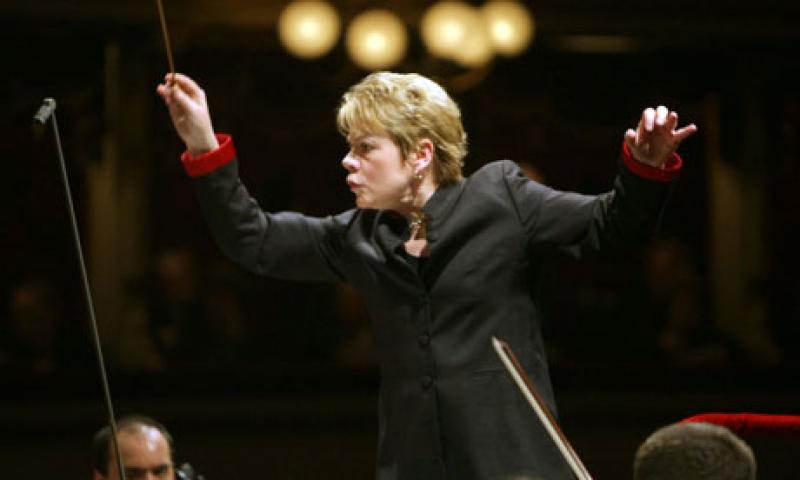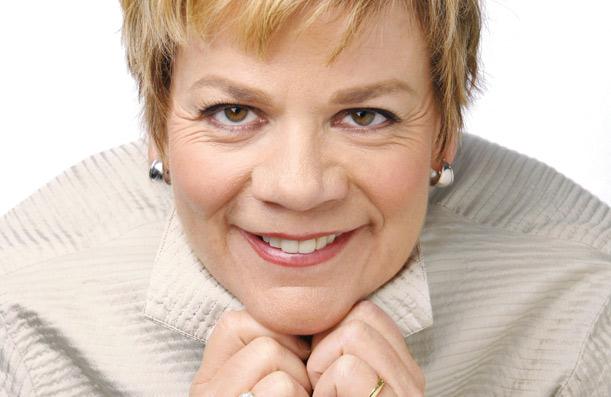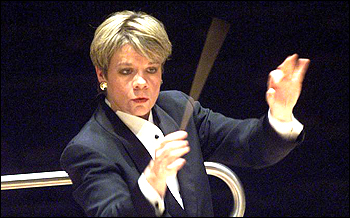10 Questions for Conductor Marin Alsop | reviews, news & interviews
10 Questions for Conductor Marin Alsop
10 Questions for Conductor Marin Alsop
The first female conductor of the Last Night of the Proms speaks out about gender

Marin Alsop may be one of America’s leading conductors, with stints as music director of the Colorado, Eugene and Richmond symphony orchestras, not to mention positions at the Bournemouth Symphony Orchestra, Royal Scottish National Orchestra, City of London Sinfonia, and of course her current roles at the head of the Baltimore and São Paulo State Symphony orchestras, but apparently none of that is as important as the fact that she’s a woman.
Taking up the baton as the first female conductor of the Last Night of the Proms, Alsop is once again in the spotlight for the gender-discussions that have followed her throughout her career. She’s a passionate and articulate advocate for women’s equality, and as founder of the Taki Concordia Fellowship has done more than most to advance the cause of women on the podium. Before she once again steps up to show the world who really wears the (Union Jack-printed) trousers, Alsop speaks to theartsdesk about musical firsts, fellowships and female conductors.
ALEXANDRA COGHLAN: Did you realise immediately when you were asked that you were the first woman to conduct at the Last Night of the Proms?
 MARIN ALSOP: I only realised after they told me. My first thought certainly wasn’t “Oh my goodness, I’m going to be the first woman”. That’s never my first thought!
MARIN ALSOP: I only realised after they told me. My first thought certainly wasn’t “Oh my goodness, I’m going to be the first woman”. That’s never my first thought!
Was it surprising to you that you were?
It’s surprising that it has taken this long.
Do you think it’s an omission of accident rather than intent?
Well that’s the big question, isn’t it? It’s shocking to me that I still come across these firsts so frequently. I am surprised, and a little bit disappointed, that there can still be so many firsts for women in this profession. I don’t know why that is. All I can say is that I’m hoping that there will be a fat succession of many women once I break through the sound barrier.
Do your resent that it’s always you having to break new ground? I was astonished, reading your CV, to discover that you were the first woman to record a Mahler symphony with a major orchestra – it seems unbelievable.
 There just haven’t been that many women in the position where they can do these kinds of things. I had a funny experience when I conducted the Concertgebouw Orchestra and they sent out a press release saying that I was the first woman in however many hundred years. They had to retract the statement because it turned out that there had been one woman who conducted one piece 100 hundred years ago. You have to keep a good sense of humour about it all. It gives me a tremendous opportunity to raise awareness about the broader issue, which doesn’t seem to be on a lot of people’s radar. And it’s not just in my profession, though it is more obvious here because it is such an obviously conservative, old-fashioned field. There are so many fields where there are still firsts for women and it’s not something that we talk about enough.
There just haven’t been that many women in the position where they can do these kinds of things. I had a funny experience when I conducted the Concertgebouw Orchestra and they sent out a press release saying that I was the first woman in however many hundred years. They had to retract the statement because it turned out that there had been one woman who conducted one piece 100 hundred years ago. You have to keep a good sense of humour about it all. It gives me a tremendous opportunity to raise awareness about the broader issue, which doesn’t seem to be on a lot of people’s radar. And it’s not just in my profession, though it is more obvious here because it is such an obviously conservative, old-fashioned field. There are so many fields where there are still firsts for women and it’s not something that we talk about enough.
You founded the Taki Concordia Fellowship for female conductors. How does the programme work?
When I started conducting I sort of assumed that in 10 years’ time that there would be a lot of women in the field. Then I found myself looking around 30 years later and not finding many; it’s still kind of lonely out there. I realised that part of the problem and the challenge is that in conducting you can’t practise your instrument until you are in front of 100 people. The pressure is enormous, and you need to have somewhere to make some mistakes to allow you to experiment. But when you might only ever have one opportunity that’s not the moment to take some risks and to find your way. So really I wanted to try and create a fellowship where I give talented young women the opportunity to learn and make mistakes – all the things that are so critical to one’s development. So I set up this fellowship in 2002.
What have the results been like?
Well we’ve just appointed the eighth recipient. Three of our former fellows are now music directors of American orchestras now, and they are all working successfully. My goal was not only to give female conductors opportunities out of the huge spotlight, but to give musicians and audiences the opportunity to see a variety of women on the podium, not just me. I think that’s really important because society gets used to these things very slowly so you just have to keep kicking away at expectations. It’s just about comfort level for people – they aren’t used to it, so I am trying to create more opportunities for them to.
 Conducting is the art of translating physical gesture into sound. Is there something in female gesture as opposed to male gesture, because of the difference in the physicality, that translates into different responses from an orchestra?
Conducting is the art of translating physical gesture into sound. Is there something in female gesture as opposed to male gesture, because of the difference in the physicality, that translates into different responses from an orchestra?
Everything we do is about gesture and the way humanity interprets gestures. The same gesture from a woman and a man is completely different. I talk to conductors a lot about trying to neutralise or de-genderise their gestures so that there are no stereotypical associations. As a woman conductor if you extend your little finger on your baton hand it looks like you’re having tea – unconsciously people will find it lightweight. If a man does it it’s usually interpreted as a gesture of sensitivity. You really have to really go through your physical vocabulary and analyse it from many different levels.
Who are the other female conductors working today that you admire particularly?
 JoAnn Falletta (pictured left), who is the music director at Buffalo and also in Dublin, has been doing very well on a parallel career to mine. Among the up-and-comings there are some wonderful conductors. I would name all my Taki alumni, who are doing incredibly. It’s a very exciting time for women in the field. The best story I ever heard on this subejct was from a conductor a generation before me – Catherine Comet. She took her small daughter, who had only ever previously been to her mother’s concerts, to another performance. When the conductor came onto stage she said loudly to Catherine: “Mummy, look, it’s a man!” It’s all a matter of perception.
JoAnn Falletta (pictured left), who is the music director at Buffalo and also in Dublin, has been doing very well on a parallel career to mine. Among the up-and-comings there are some wonderful conductors. I would name all my Taki alumni, who are doing incredibly. It’s a very exciting time for women in the field. The best story I ever heard on this subejct was from a conductor a generation before me – Catherine Comet. She took her small daughter, who had only ever previously been to her mother’s concerts, to another performance. When the conductor came onto stage she said loudly to Catherine: “Mummy, look, it’s a man!” It’s all a matter of perception.
You brought the São Paulo State Symphony Orchestra to the Proms last year. What is so special about the festival?
It’s just a huge celebration. There’s a party atmosphere and I think it’s a moment for people to share unity and let their hair down and enjoy things in a way you might not do every day. We had such a great time at the Proms last year. There was such a great patriotic feeling in the hall, with so many people waving Brazilian flags. For me the Last Night is particularly significant and meaningful because the UK is a second home for me. I think that British musicians are at the absolute top of the food chain. They are passionate, work so hard, and have a great sense of humour. Those are my three favourite qualities in any performers.
And you’ll be working with Joyce DiDonato for the first time…
Yes. I’m very excited because although I know Joyce I’ve never worked with her, and the same thing is true of Nigel Kennedy. So it’ll be an evening of firsts for everyone!
Explore topics
Share this article
The future of Arts Journalism
You can stop theartsdesk.com closing!
We urgently need financing to survive. Our fundraising drive has thus far raised £49,000 but we need to reach £100,000 or we will be forced to close. Please contribute here: https://gofund.me/c3f6033d
And if you can forward this information to anyone who might assist, we’d be grateful.

Subscribe to theartsdesk.com
Thank you for continuing to read our work on theartsdesk.com. For unlimited access to every article in its entirety, including our archive of more than 15,000 pieces, we're asking for £5 per month or £40 per year. We feel it's a very good deal, and hope you do too.
To take a subscription now simply click here.
And if you're looking for that extra gift for a friend or family member, why not treat them to a theartsdesk.com gift subscription?
more Classical music
 First Person: clarinettist Oliver Pashley on the new horizons of The Hermes Experiment's latest album
Compositions by members of this unusual quartet feature for the first time
First Person: clarinettist Oliver Pashley on the new horizons of The Hermes Experiment's latest album
Compositions by members of this unusual quartet feature for the first time
 Gesualdo Passione, Les Arts Florissants, Amala Dior Company, Barbican review - inspired collaboration excavates the music's humanity
At times it was like watching an anarchic religious procession
Gesualdo Passione, Les Arts Florissants, Amala Dior Company, Barbican review - inspired collaboration excavates the music's humanity
At times it was like watching an anarchic religious procession
 Classical CDs: Camels, concrete and cabaret
An influential American composer's 90th birthday box, plus British piano concertos and a father-and-son duo
Classical CDs: Camels, concrete and cabaret
An influential American composer's 90th birthday box, plus British piano concertos and a father-and-son duo
 Cockerham, Manchester Camerata, Sheen, Martin Harris Centre, Manchester review - re-enacting the dawn of modernism
Two UK premieres added to three miniatures from a seminal event of January 1914
Cockerham, Manchester Camerata, Sheen, Martin Harris Centre, Manchester review - re-enacting the dawn of modernism
Two UK premieres added to three miniatures from a seminal event of January 1914
 Kempf, Brno Philharmonic, Davies, Bridgewater Hall, Manchester review - European tradition meets American jazz
Bouncing Czechs enjoy their Gershwin and Brubeck alongside Janáček and Dvořák
Kempf, Brno Philharmonic, Davies, Bridgewater Hall, Manchester review - European tradition meets American jazz
Bouncing Czechs enjoy their Gershwin and Brubeck alongside Janáček and Dvořák
 Solomon, OAE, Butt, QEH review - daft Biblical whitewashing with great choruses
Even a top soprano and mezzo can’t make this Handel paean wholly convincing
Solomon, OAE, Butt, QEH review - daft Biblical whitewashing with great choruses
Even a top soprano and mezzo can’t make this Handel paean wholly convincing
 Two-Piano Gala, Kings Place review - shining constellations
London Piano Festival curators and illustrious friends entertain and enlighten
Two-Piano Gala, Kings Place review - shining constellations
London Piano Festival curators and illustrious friends entertain and enlighten
 Echo Vocal Ensemble, Latto, Union Chapel review - eclectic choral programme garlanded with dance
Beautiful singing at the heart of an imaginative and stylistically varied concert
Echo Vocal Ensemble, Latto, Union Chapel review - eclectic choral programme garlanded with dance
Beautiful singing at the heart of an imaginative and stylistically varied concert
 Scott, Irish Baroque Orchestra, Whelan, RIAM, Dublin review - towards a Mozart masterpiece
Characteristic joy and enlightenment from this team, but a valveless horn brings problems
Scott, Irish Baroque Orchestra, Whelan, RIAM, Dublin review - towards a Mozart masterpiece
Characteristic joy and enlightenment from this team, but a valveless horn brings problems
 Classical CDs: Voice flutes, flugelhorns and froth
Baroque sonatas, English orchestral music and an emotionally-charged vocal recital
Classical CDs: Voice flutes, flugelhorns and froth
Baroque sonatas, English orchestral music and an emotionally-charged vocal recital
 Kanneh-Mason, Britten Sinfonia, Shave, Milton Court - a grin and a big beaming smile
A pair of striking contemporary pieces alongside two old favourites
Kanneh-Mason, Britten Sinfonia, Shave, Milton Court - a grin and a big beaming smile
A pair of striking contemporary pieces alongside two old favourites

Add comment